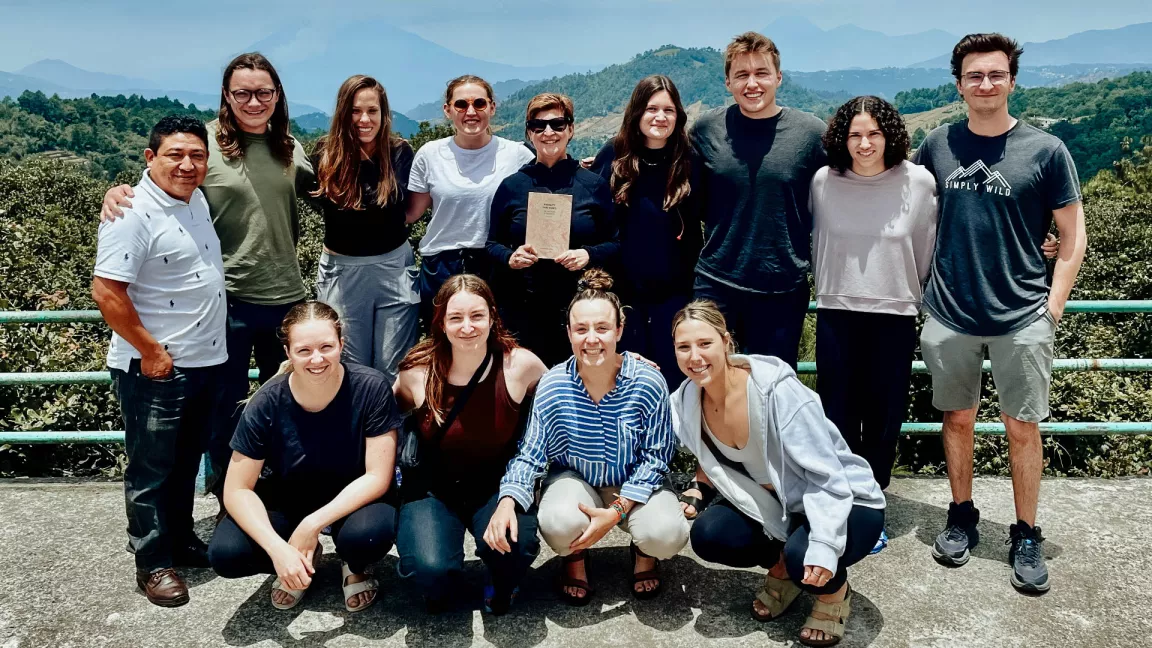Voices of justice and memory in Guatemala
A field school in Guatemala led by Geography Professor Dr. Catherine Nolin examined human rights violations, historical memory and Canada’s role in global justice. The experience resulted in an academic paper and a StoryMap amplifying the voices of Guatemalan people.

Prince George, B.C. - In May of 2023, a group of university students from UNBC, Dalhousie University and Brock University joined Geography Professor Dr. Catherine Nolin for an immersive field school experience in Guatemala. The program explored themes of historical memory, genocide, forced disappearances and Canada’s connections to mining as well as social and environmental justice in the region.
After an intense week-long preparatory course on UNBC's campus in Prince George, the students then embarked on a two-week field school in Guatemala — co-organized with Rights Action — visiting communities across the country. They engaged directly with local community members who shared their experiences of injustice and exploitation.
In the semesters after the field school, students worked with Nolin to use ArcGIS StoryMaps, a digital tool that combines photos, reflections and mapped locations to document their experiences. This interactive platform allowed them to create powerful narratives of the struggles, resilience and justice efforts they witnessed, making complex issues more accessible to broader audiences.
The experiences of the field school and the creation of the StoryMap led to the publication of an academic paper this fall in the Journal of Latin American Geography titled “UNBC-Rights Action Experiential Learning in Guatemala 2023: ArcGIS StoryMap on the Global Order, Injustice, and Resistance in Guatemala.” Co-authored by Nolin, participating UNBC students Mikhaila Carr, Will Hanlon, Cyan LeMoal, Jakob and Mackenzie Ostberg, August Reed, Tyler Slaney as well as students from Brock University and Dalhousie University, the paper highlights the field school’s role in documenting the lived realities of Guatemalan communities.
Reflecting UNBC’s commitment to cultivating curiosity and fostering local solutions for a global impact, the experience left students with lasting insights. “It definitely made me think twice about what I’ve learned, who is writing it and the biases behind it all,” shares recent UNBC Geography graduate August Reed. “I’m more inclined now to dig deeper and question the narratives I encounter.”
The StoryMap highlights the lived experiences of Guatemalan communities and their ongoing struggles for justice. For Will Hanlon, UNBC’s Class of 2024 Valedictorian graduating with a Bachelor of Arts with a joint major in Geography and Political Science, the visit to Río Negro was particularly impactful. “You see what happens to them during the internal conflict, where the state tried to erase their community for a hydroelectric dam,” he reflects. “Now, they’re working to hold people accountable and reclaim their history. It connects directly to the themes of truth, memory and justice we discussed throughout the course.”
In contrast to the heavy topics of injustice and exploitation, students also witnessed inspiring acts of resilience. Indigenous communities are returning to ancestral agricultural practices, using agroecology to sustain themselves amid the growing climate crisis. “We saw the resilience of communities moving forward with sustainable practices,” says recent graduate Cyan LeMoal. “It reminded us there’s a way forward.”
“In an era where our connections are increasingly global, it’s crucial to understand the impact our actions and economies have on other communities,” says Nolin, Chair of UNBC’s Department of Geography, Earth and Environmental Sciences. “This field school goes beyond observation; it challenges students to witness and reflect on these realities deeply, fostering a meaningful sense of responsibility and solidarity.”
Nolin and Grahame Russell of Rights Action will lead the next Guatemala field school in May 2025. Open to senior undergraduate and graduate students from across Canada, it will mark the 10th offering of the program. “Meeting and bearing witness with people who have lived through human rights violations and violence transforms abstract concepts into deeply human stories that encourage reflection and action,” says Nolin.
Learn more about the 2025 Guatemala Field School here.